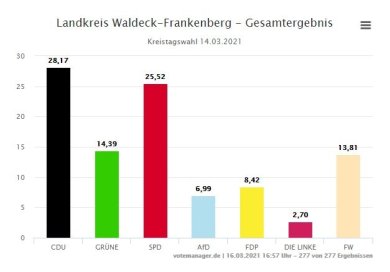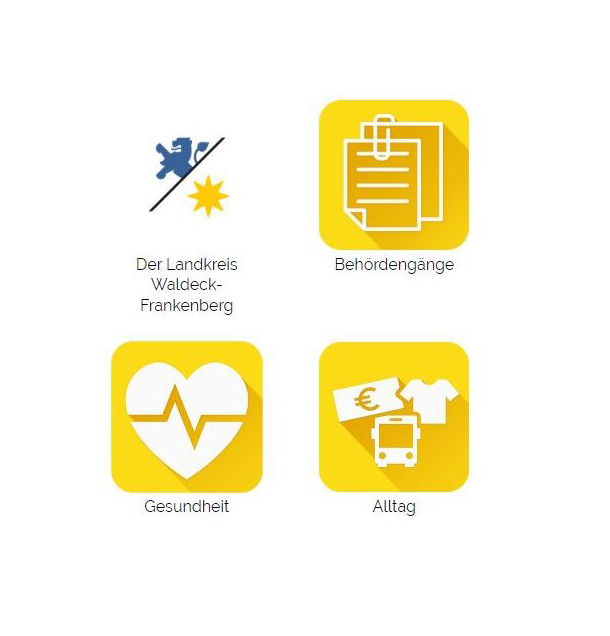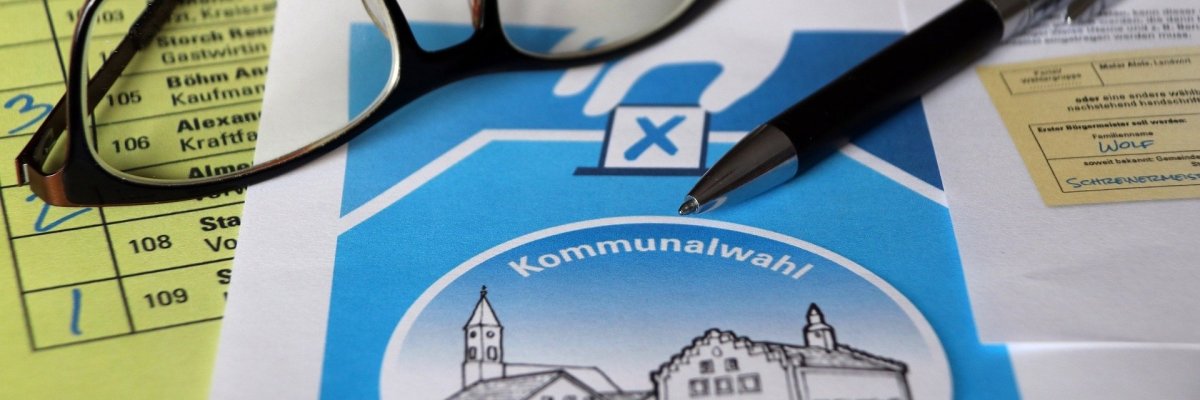Local elections 2021
Local elections 2021

Final result available
The final result of the municipal election in the district of Waldeck-Frankenberg is determined after the electoral committee has officially established it.
The final result of the 2021 municipal election in the Waldeck-Frankenberg district has been determined. The ballots from the election on 14 March have been counted. It is thus clear how many seats the parties will receive in the district council - and also which MPs have actually been elected to parliament.
According to the results, the CDU is the strongest parliamentary group in the district council with 28.17 percent of the vote, followed by the SPD with 25.52 percent and the GREENS with 14.39 percent. They are followed by the FREIE WÄHLER with 13.81 per cent, the FDP with 8.42 per cent, the AfD with 6.99 per cent and DIE LINKE with 2.70 per cent. As things stand at present, the CDU has 20 seats in the district council, the SPD 18, the Greens 10, the Free Voters 10, the FDP 6, the AfD 5 and the Left Party 2.
The voter turnout in the 2021 local elections in Waldeck-Frankenberg was 52.55 per cent. The local elections took place on 14 March 2021. Depending on the number of inhabitants in the electoral area, 15 to 105 municipal representatives were elected in the municipal election, three to 19 local council members in the local council election and 51 to 93 district council members in the district election. In the district of Waldeck-Frankenberg, 71 district councillors were elected.
For the election of the district council, seven election proposals had previously been received by the district election officer in due time by 4 January 2021. The meeting of the district electoral committee, which decided on the admission of the submitted nominations, took place on 15 January 2021 in the district hall in Korbach. A total of 364 people from seven election proposals applied for the 71 seats in the district council, whose legislative period begins on 1 April 2021. These were submitted by the CDU, DIE GRÜNEN, SPD, AfD, FDP, DIE LINKE and FW.
Electoral system
In municipal elections - provided that at least two lists are admitted - elections are held according to the principles of proportional representation combined with elements of personal election. In this system, each eligible voter has as many votes as there are seats to be allocated in the body to be elected. The votes may be allocated individually or in clusters (cumulating) to the candidates, also from different election proposals (variegating). It is also possible to accept election proposals unchanged, to delete individual candidates from an election proposal or to combine the various voting options. The local elections are the fifth time that the procedure of cumulating and panashing votes has been used, giving all eligible voters more opportunities to cast the votes available to them. Further information on the elections and the electoral system is also available at www.wahlen.hessen.de or www.deinedemokratie.de.
Choose corona compliant
Due to the still dynamic infection situation, it can be assumed that the pandemic-related restrictions will also have an impact on the local elections to be held on 14 March 2021. However, eligible voters can be assured that all necessary precautions will be taken in the preparation of the elections to exclude any risk to the health of eligible voters and election committee staff.
This includes the following measures:
- Compulsory wearing of masks in the voting room as well as in the building in which the voting room is located.
- Preparation of the voting rooms so that distances are observed and regular ventilation is possible.
- Ballpoint pens for voting in the booths are available. To eliminate any risk of infection, eligible voters may also use their own pen to mark their ballot paper.
- Equipping the electoral boards with mouth-nose coverings
Postal vote
If eligible voters want to exclude any risk of infection, there is also the option of voting by postal ballot. To do so, they need a ballot paper, which can be applied for using the form on the back of the election notification. When applying, eligible voters must state their surname, first name, date of birth and address. You will receive a ballot paper together with the application form:
- one ballot paper for each of the elections for which you are eligible to vote
- one official ballot paper envelope each in the colour of the ballot paper
- a ballot paper envelope, which the municipality has franked
and
- a leaflet on postal voting, which gives explanations in words and pictures on how to cast one's votes by postal voting
Eligible voters can also apply for and collect the ballot paper and absentee ballot documents in person at the electoral office. There is also the possibility to cast the votes directly on site.

